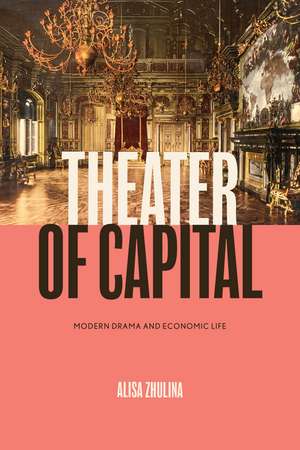Theater of Capital: Modern Drama and Economic Life: Performance Works
Autor Alisa Zhulinaen Limba Engleză Paperback – 15 ian 2024
Emerging amid the turbulent rise of market finance and wider socioeconomic changes, modern drama enacted vital critiques of art and life under capitalism. Alisa Zhulina shows how fin-de-siècle playwrights such as Henrik Ibsen, August Strindberg, Anton Chekhov, George Bernard Shaw, and Gerhart Hauptmann interrogated the meaning of this newly coined economic concept. Acutely aware of their complicity in the system they sought to challenge, these playwrights staged economic questions as moral and political concerns, using their plays to explore the theories of Adam Smith, Karl Marx and Friedrich Engels, Max Weber, and others within the boundaries of bourgeois theater.
Theater of Capital: Modern Drama and Economic Life reveals the prescient and unsettling visions of life in a new financial and societal reality in now-canonical plays such as A Doll’s House, Miss Julie, and The Cherry Orchard, as well as in lesser-known and long-overlooked works. This wide-ranging study prompts us to reevaluate modern drama and its legacy for the urgent economic and political questions that haunt our present moment.
Preț: 314.60 lei
Nou
Puncte Express: 472
Preț estimativ în valută:
60.20€ • 63.30$ • 49.74£
60.20€ • 63.30$ • 49.74£
Carte indisponibilă temporar
Doresc să fiu notificat când acest titlu va fi disponibil:
Se trimite...
Preluare comenzi: 021 569.72.76
Specificații
ISBN-13: 9780810146341
ISBN-10: 0810146347
Pagini: 296
Ilustrații: 3 b-w images
Dimensiuni: 152 x 229 x 23 mm
Greutate: 0.43 kg
Editura: Northwestern University Press
Colecția Northwestern University Press
Seria Performance Works
ISBN-10: 0810146347
Pagini: 296
Ilustrații: 3 b-w images
Dimensiuni: 152 x 229 x 23 mm
Greutate: 0.43 kg
Editura: Northwestern University Press
Colecția Northwestern University Press
Seria Performance Works
Notă biografică
ALISA ZHULINA is an assistant professor in the Department of Drama at New York University.
Cuprins
Acknowledgments
Introduction
Chapter 1: Finance Capital: Henrik Ibsen and the Invisible Hand
Chapter 2: The Dowry versus Erotic Capital: The Drama of Courtship in Strindberg, Shaw, and Benedictsson
Chapter 3: Casino Capitalism: Anton Chekhov and Gambling
Chapter 4: Labor and Strike: Gerhart Hauptmann’s The Weavers and Its Legacy in German Expressionism
Coda
Notes
Bibliography
Introduction
Chapter 1: Finance Capital: Henrik Ibsen and the Invisible Hand
Chapter 2: The Dowry versus Erotic Capital: The Drama of Courtship in Strindberg, Shaw, and Benedictsson
Chapter 3: Casino Capitalism: Anton Chekhov and Gambling
Chapter 4: Labor and Strike: Gerhart Hauptmann’s The Weavers and Its Legacy in German Expressionism
Coda
Notes
Bibliography
Recenzii
“[Zhulina] offers revelatory readings of the most familiar plays her theories touch (A Doll’s House, Miss Julie, Mrs. Warren’s Profession, The Cherry Orchard, etc.) before attending to the various afterlives of these plays . . . It becomes clear that any feature of our lives – material or spiritual, aesthetic or ideological, the world-historical or the everyday – could be drawn into the vortex we call “economics.” Zhulina reminds us of the strength in such a richly economic perspective, which after all need not limit itself to markets and money.” —Modern Drama
“An extraordinary book whose scope and ambition are truly impressive. Alisa Zhulina works hard to overcome the academic silos that separate the humanities from economic theory by recuperating a more expansive notion of economics—that of the oikos—to put them in a productive exchange. All of this is executed with the highest rigor, intelligence, and creativity, and grounded in an expansive knowledge of the materials. There aren’t many scholars today who can match Zhulina’s linguistic and intellectual range.” —Leonardo Lisi, Johns Hopkins University
“The work of a true comparatist, Theater of Capital demonstrates, in a series of revelatory and nuanced readings, how canonical and not-so-canonical writers’ knowledge of money saturates the language—even the gestures—of their plays and prose.” —Martin Harries, University of California, Irvine
“An extraordinary book whose scope and ambition are truly impressive. Alisa Zhulina works hard to overcome the academic silos that separate the humanities from economic theory by recuperating a more expansive notion of economics—that of the oikos—to put them in a productive exchange. All of this is executed with the highest rigor, intelligence, and creativity, and grounded in an expansive knowledge of the materials. There aren’t many scholars today who can match Zhulina’s linguistic and intellectual range.” —Leonardo Lisi, Johns Hopkins University
“The work of a true comparatist, Theater of Capital demonstrates, in a series of revelatory and nuanced readings, how canonical and not-so-canonical writers’ knowledge of money saturates the language—even the gestures—of their plays and prose.” —Martin Harries, University of California, Irvine
Descriere
Alisa Zhulina shows how canonical fin-de-siècle playwrights interrogated the meaning of capitalism, staging economic questions as moral and political concerns and challenging contemporary socioeconomic theories within the boundaries of bourgeois theater.















